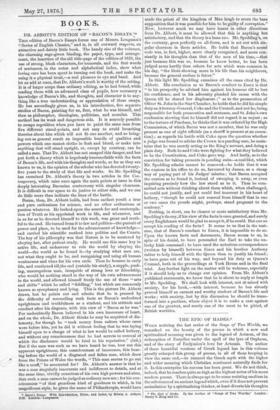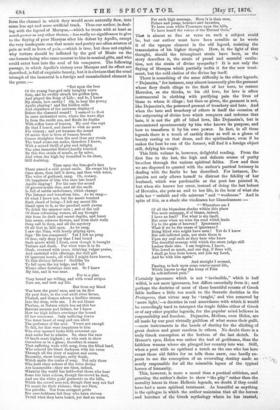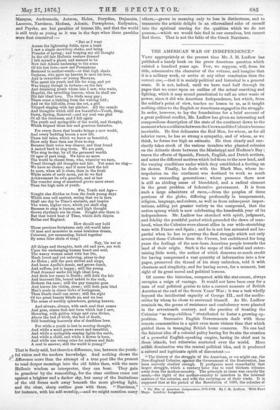THE EPIC OF HADES.*
WHEN noticing the last series of the Songs of Two Worlds, we remarked on the beauty of the poems in which a new and spiritualised meaning was given to the legend of Action, of the redemption of Eurydice under the spell of the lyre of Orpheus, and of the story of Endymion's love for Artemis. The author of these beautiful versions of Greek legend has in this volume greatly enlarged this group of poems, in all of them keeping in view the same end,—to connect the Greek myth with the higher and wider meaning which Christian sentiment naturally finds for it. In this enterprise his success has been great. We do not think, indeed, that he reaches quite as high as the highest notes of his more modern poems. There is always apt to be some resisting medium in the substance of an ancient legend which, even if it does not prevent assimilation by a spiritualising thinker, at least diverts his thoughts • The Epic of Hades. By the Author of "Songs of Two Worlds." London : Henry B. King and Co.
from the channel in which they would more naturally flow, into some less apt and more artificial track. Thus our author, in deal- ing with the legend of Marsyas,—which he treats with at least as much power as any other theme,—has really no significance to give to the flaying of poor Marsyas after his defeat by Apollo, except the very inadequate one that music and poetry are often sources of pain as well as born of pain,—which is true, but does not explain why torture should be inflicted by the god 'of Music on the one human being who came nearest to him in musical gifts, and who could enter best into the soul of his conqueror. The following passage, in which Apollo's victory over Marsyas and its effect are described, is full of exquisite beauty, but it is obvious that the cruel triumph of the immortal is a foreign and unaaeimilated element in the poem :—
"Bat upon the face Of the young Sun-god only haughty scorn Sate, and he swiftly struck his golden lyre, And played the Song of Life ; and lo, I knew My strain, how earthy! Oh, to hear the young Apollo playing! and the hidden cells And chambers of the universe displayed Before the charmed sound! I seemed to float In some enchanted cave, where the wave dips In from the sunlit sea, and floods its depths With reflex hues of heaven. My soul was rapt By that I heard, and dared to wish no more For victory; and yet because the sound Of music that is born of human breath Comes straighter from the soul than any strain The hand alone can make, therefore I knew, With a mixed thrill of pity and delight, The nine immortal Sisters,hardly touched By this fine strain of music, as by mine, And when the high lay trembled to its close, Still doubting.
Then upon the Sun-god's face There passed a cold proud smile. He swept his lyre Once more, then laid it down, and then with voice, The voice of godhead, sang. Oh, ecstasy. Oh happiness of him who once has heard Apollo singing! For his ears the sound Of grosser music dies and all the earth Is full of subtle undertones, which change The listener and transform him. As he sang— Of what I know not, but the music touched Each chord of being—I felt my secret life Stand open to it, as the parched earth yawns To drink the summer rain ; and at the call Of those refreshing waters, all my thought Stir from its dark and secret depths, and burst Into sweet, odorous flowers, and from their wells Deep call to deep, and all the mystery Of all that is, laid open. As he sang, I saw the Nine, with lovely pitying eyes, Sign 'He has conquered.' Yet I felt no pang Of fear, only deep joy that I had heard Such music while I lived, even though it brought Torture and death. For what were it to lie Sleek, crowned with roses, drinking vulgar praise, And surfeited with offerings, the dull gift Of ignorant hands, all which I might have known, To this diviner failure ? Godlike 'tis To fail upon the icy ledge, and fall Where other footsteps dare not. So I knew My fate, and it was near. For to a pine They bound me willing, and with cruel stripes Toro me, and took my life.
But from my blood Was born the poets' race, and on its flow My poor flute, to the cool swift river borne, Floated, and thence adown a lordlier stream Into the deep, wide sea. I do not blame Phcebns, or Nature which has set this bar Betwixt success and failure, for I know How far high failure overleaps the bound Of low successes. Only suffering draws The inner heart of song and can elicit The perfumes of the soul. 'T were not enough To fail, for that were happiness to him Who ever upward looks with reverent eye And seeks but to admire. So, since the race Of bards soars highest ; as who seek to show Ourselves as in a glass; therefore it comes That suffering weds with song, from the blind bard, Who solaced his blank darkness with his verse Through all the story of neglect and scorn, Necessity, sheer hunger, early death, Which smite the ranks of song. Not only those Who hold clear echoes of the voice divine Are honourable—they are blest, indeed, Whateer the world has held—but those who hear Some fair faint echoes, though the crowd be deaf, And see the white gods' garments on the hills, Which the crowd sees not, though they may not find Fit music for their visions ; they are blest, Not pitiable. Not from arrogant pride Nor over-boldness fail they who have striven To tell what they have heard, yet find no voice For such high message. More it is than ease, Palace and pomp, honours and luxuries, To have seen white Presences upon the hills, To have heard the voices of the Eternal Gods."
That is almost as fine as verse on such a subject could be, but our author must have been sensible as he wrote it of the opaque element in the old legend, resisting the transmission of his higher thought. How, in the light of that thought, should the triumphant strain have been, as the story describes it, the strain of proud and scornful exulta- tion, not the strain of divine sympathy? It is not only the flaying of Mamas which partially unfits it for the new treat- ment, but the cold elation of the divine lay itself.
There is something of the same difficulty in the other legends.
" Dejaneira," for instance, may almost innocently give the garment whose fiery death clings to the flesh of her hero, to restore Hercules, as she thinks, to his old love, for love is often instrumental in clothing with purifying pain the lives of 'those to whom it clings ; but then so given, the garment is not, like Dejaneira's, the poisoned present of treachery and hate. And when the hate and treachery of others is itself the occasion of
the outpouring of divine love which conquers and redeems that hate, it is not the gift of blind love, like Dejaneira's, but is encountered spontaneously by him who knows its purpose, and how to transform it by his own power. In fact, in all these legends there is a touch of earthly dross as well as a gleam of beauty resting on that dross, and the spiritualiser, even if he makes the best he can of the former, will find it a foreign object
still, defying his magic.
This little volume is, however, delightful reading. From the first line to the last, the high and delicate aroma of purity breathes through the various spiritual fables. Now and then we are disposed to quarrel with the author's poetical leniency in dealing with the faults he has described. For instance, De- janeira not only allows herself to distrust the fidelity of her husband, which was pardonable as the poet has painted it, but when she knows her error, instead of doing the last behest of Hercules, she puts an end to her life, in the hour of what she calls her " unfaith and vile mistrust" and "weakness." And in spite of this, as a shade she vindicates her blamelessness :—
"'Wherefore am I
Of all the blameless shades within this place The most unhappy, if of blame, indeed.
I have no load? For what is sin itself, But error when we miss the road which leads Up to the gate of heaven? Ignorance ! What if we be the cause of ignorance ?
Being blind who might have seen ! Yet do I know But self-inflicted pain, nor stain there is Upon my soul such as they bear who know The dreadful scourge with which the stern judge still Lashes their sins. I am forgiven, I know, Who loved so much, and one day, if Zeus will, I shall go free from hence, and join my Lord, And be with him again.'
And straight I seemed, Passing, to look upon some scarce-spent life, Which knows to-day the irony of Fate In self-inflicted pain."
Certainly ignorance which is not "invincible," which is half wilful, is not mere ignorance, but differs essentially from it; and perhaps the doctrine of most of these beautiful recasts of Greek fable inclines a little too much to the Socratic doctrine in the Protagoras, that virtue may be taught,' and vice removed by more light,'—a doctrine in real accordance with which it would be exceedingly hard to interpret the tragic fables either of Greek or of any other popular legends, for the popular mind believes in responsibility and freedom. Dejaneira, Medusa, even Helen, are all made by our poet virtually guiltless of what seems their guilt, —mere instruments in the hands of destiny for the eliciting of great desires and great resolves in others. No doubt there is a truly Greek conception at the bottom of the last sketch. In Homer's eyes, Helen was rather the tool of goddesses, than the faithless woman whose sin plunged her country into war. Still, when a poet with so spiritual a touch as the one who has here recast these old fables for us tells them anew, one hardly ex- pects to see the conception of an overruling destiny made so nearly responsible for all the miserable lapses of the typical heroes of humanity.
This, however, is more a moral than a poetical criticism, and granting the author's desire to show "the pity" rather than the morality latent in these Hellenic legends, we doubt if they could have had a more spiritual treatment. As beautiful as anything is the epilogue in which the author maintains that all the heroes and heroines of the Greek mythology whom he has treated,
Marsyas, Andromeda, Acton, Helen, Eurydice, Dejaneira, Laocoon, Narcissus, Medusa, Adonis, Persephone, Endymion, and Psyche, are but parables of human life, and that the world is still truly as young as it was in the days when these parables were first conceived :—
Nay, 'tis not so All things and thoughts, both old and new, are writ Upon the unchanging human heart and soul.
The weary woman sated with her life, Much loved and yet unloving, pines to-day As Helen ; still the poet strives and sings, And hears Apollo's music, and grows (lamb, And suffers, yet is happy; still the young Fond dreamer seeks his high ideal love, And finds her name is Death; still doth the fair And innocent life, bound naked to the rock, Redeem the race ; still the gay tempter goes And leaves his victim, stone ; still doth pain bind Men's souls in closer links of lovingness, Than Death itself can sever; still the sight Of too great beauty blinds us, and we lose The sense of earthly splendours, gaining heaven.
And always, always, with each soul that comes And goes, comes that fair form which last I saw, Hovering, with golden wings and eyes divine, Above the bed of birth, the bed of death, Still breathing heavenly airs of deathless love.
For while a youth is lost in soaring thought, And while a maid grows sweet and beautiful, And while a springtide coming lights the earth, And while a child, and while a flower is born, And while one wrong cries for redress and finds A soul to answer, still the world is young!"
That is finely said, but thereis a difference, too, between the youth- ful vision and the modern knowledge. And nothing shows the difference more than the attempt of a true poet like the present to read deeper meanings into the old fables than, with the mere Hellenic wisdom as interpreter, they can bear. They gain in grandeur by the remoulding, for the clear outlines come out against a brighter and a darker sky, but many of the limitations of the old forms melt away beneath the more glowing light, and the clear, sharp outline goes with them. "Narcissus,"
"But as I went Across the lightening fields, upon a bank I saw a single snowdrop shake, and bring Promise of spring; and keeping my old thought In the old fair Hellenic vesture dressed I felt myself a ghost, and seemed to be Now fair Adonis hastening to the arms Of his lost love—now sad Persephone Restored to mother-earth--or that high shade Orpheus, who gave up heaven to save his love, And is rewarded—or young Marsyas, Who spent his youth and life for song, and yet Was happy though in torture—or the fair And dreaming youth whom late I saw, who waits, Hopeful, the unveiling heaven, when he shall see His fair ideal love. The birds sang gay ; There came a tinkling from the waking fold ; And on the hill-side, from the cot, a girl Tripped singing with her pitcher. All the sounds And thoughts which still are beautiful—Youth, Song, Dawn, Spring, Renewal—and my soul was glad Of all the freshness, and I felt again The youth and spring-tide of the world, and thought, Which feigned those fair and gracious fantasies.
For every dawn that breaks brings a new world, And every budding bosom a new life.
These fair tales, which we know so beautiful, Show only finer than our lives to-day Because their voice was clearer, and they found A sacred bard to sing them. We are pent, Who sing to-day, by all the garnered wealth Of ages of past song. We bare no more The world to choose from, who, where'er we tarn,
Tread through old thoughts and fair. Yet must we sing—
We have no choice; and if more hard the toil In noon, when all is clear, than in the fresh White mists of early morn, yet do we find Achievement its own gnerdon, and at last The rounder song of manhood grows more sweet Than the high note of youth.
For, Youth and Age— Nought else divides us from the fresh young days Which men call ancient, seeing that we in turn Shall one day be Time's ancients, and inspire The wiser, higher race, which yet shall sing 13ecause to sing is human, and high thought Grows rhythmic ere its close. Nought else there is But that weird beat of Time, which doth disjoin Hellas and England.
How should any bold Those precious Scriptures only old-world tales Of men and monsters in some brainless dream, Coherent, yet unmeaning, linked together By some false skein of song!
for instance, with his self-worship,—and we might mention many Maps. London : Longman&
others,—grows in meaning only to lose in distinctness, and to transmute the artistic delight in an etherealised echo of oneself into the spiritual craving for the qualities which we do not possess,—which we would fain find in our ourselves, but cannot find there. That is not the fable of the Greek Narcissus.
































 Previous page
Previous page